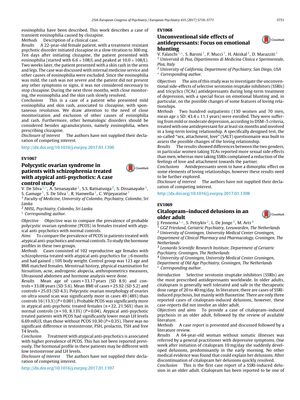Polycystic Ovarian Syndrome in Patients with Schizophrenia Treated with Atypical Antipsychotics: A Case Control Study
April 2017
in “
European Psychiatry
”

TLDR Women with schizophrenia on atypical antipsychotics are more likely to have polycystic ovarian syndrome (PCOS) than women without schizophrenia.
The study aimed to compare the prevalence of probable polycystic ovarian syndrome (PCOS) in females with schizophrenia treated with atypical antipsychotics to that in normal controls. It involved 102 female patients of reproductive age with schizophrenia who had been treated with atypical antipsychotics for at least 6 months and had gained at least 10% body weight, and 123 age and BMI-matched control females. The study found that polycystic ovarian morphology on ultrasound was significantly more common in the cases (48%) than in the controls (13%) (P<0.001). Probable PCOS was also significantly more prevalent in the atypical antipsychotic-treated females (21.56%) compared to the normal controls (8.13%) (P=0.04). The hormonal profile of atypical antipsychotic-treated patients with PCOS showed significantly lower mean LH levels than those without PCOS, but there was no significant difference in testosterone, FSH, prolactin, TSH, and free T4 levels. The conclusion drawn from the study is that treatment with atypical antipsychotics is associated with a higher prevalence of PCOS, and this association had not been reported previously. The study suggests that the hormonal profile in these patients may differ, with low testosterone and LH levels.

